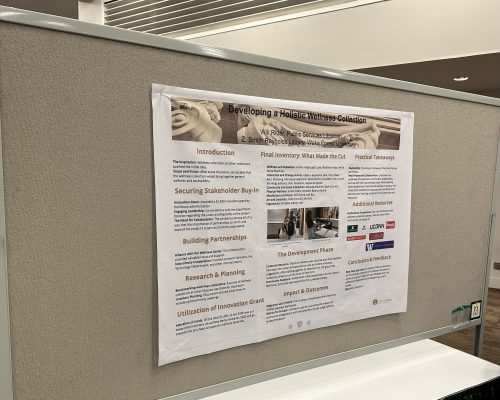While I had the opportunity to attend the North Carolina Library Association (NCLA) Conference for only a single day, even this brief exposure provided a profound insight into the multifaceted roles and responsibilities that contemporary libraries are expected to fulfill. The sessions I attended represent just a sampling of the many enlightening topics discussed at the conference.
One notable session that captivated my attention was conducted by our own Kaeley McMahan and Meghan Webb. They eloquently articulated the evolving role of libraries within artistic communities. Rather than simply serving as curators of art-related materials, McMahan and Webb contended that librarians should adopt the role of facilitators. They could, for instance, connect artists to research-based practices or even specialized training programs—perhaps in collaboration with local arts organizations.
In another session, Anna Craft and Rachel Olsen from The University of North Carolina at Greensboro emphasized the ongoing relevance of writing within both academic and broader communities. According to Craft and Olsen, libraries should be more than mere repositories of written works; they ought to actively cultivate the writing process. This could involve a multitude of approaches, such as sponsoring community-based writing groups or offering workshops focused on academic authorship. The session highlighted the diverse range of written materials—from training manuals to scholarly articles—that libraries could use as resources to fulfill this role.
One of the sessions tailored specifically to the needs of North Carolina libraries addressed the critical issue of accessibility. Presented by Devon Waugh and Claire Leverett of NC LIVE, the session delved into the multifaceted nature of accessibility. This includes making adjustments in physical spaces and optimizing digital interfaces. The presenters made a compelling case for the ongoing education and training of library staff in accessibility protocols and technologies, framing it not merely as a logistical necessity but as a moral and ethical obligation.

My own short-lived but enriching contribution to the NCLA Conference involved presenting a poster session on behalf of Wake Forest University. I showcased our ongoing project at Z. Smith Reynolds Library, focusing on the creation of a collection centered on holistic wellness. This project has been a learning experience, presenting a unique set of challenges, from procurement of funding to gaining buy-in from institutional stakeholders. My presentation served as a platform to share these challenges and the insights gained, underscoring the broader role of libraries as spaces that nourish not only intellectual growth but also emotional and physical well-being.
In conclusion, my single-day attendance at the NCLA Conference offered a brief but comprehensive glimpse into the dynamic roles that modern libraries are expected to play. The sessions I attended—from McMahan and Webb’s insights into artistic communities, to Craft and Olsen’s thoughts on the importance of writing, and Waugh and Leverett’s discussions on accessibility—affirmed that libraries must remain agile, inclusive, and innovative to meet the diverse needs of their communities.

4 Comments on ‘Adapting and Evolving: Thoughts from the North Carolina Library Association Conference’
Thanks for sharing — and for contributing a poster about developing the wellness collection!
Thank you for sharing, Will. This was indeed a wonderful conference. I was particularly impressed with how well represented ZSR was!!!
I’m glad your day at NCLA was encompassing. Thanks for sharing your experiences with setting up the well-being collection with all of the attendees!
Wow !
What a great one day visit, congratulations.